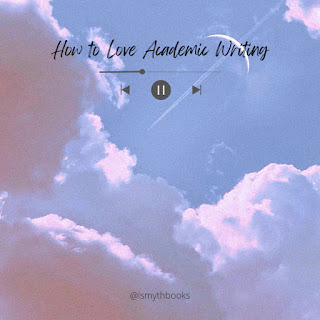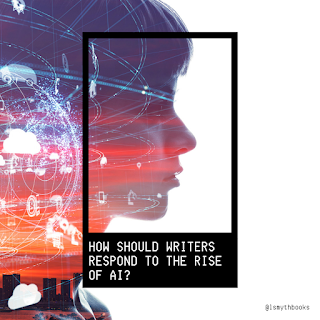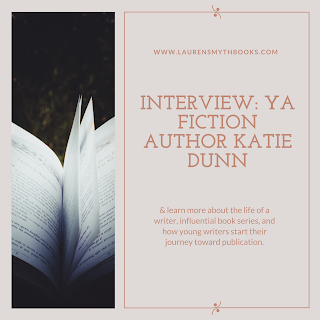Learning to Love Academic Writing
If you're reading this blog, you probably consider yourself a fiction writer. Even if you don't, you can probably agree that writing about a top secret organization is more fun than writing about the symbolism of gold and silver cups in the Odyssey. (If you disagree, you probably already love academic writing!)
I, too, am a die-hard fiction writer. I'd much rather invent my own story than write on a pre-fabricated topic. But I also want to be a journalist, and journalism is just the professional version of writing on pre-fabricated topics. So, without further ado, here's how I make it fun.
1. For any project longer than a single page, outline first. This will save you a lot of re-writing time, and it will help you make sure your point is clear. This step may sound boring, but it's often fun to think through topics you may not have considered in detail, and you might catch yourself running along rabbit trails that lead to an interesting topic.
2. Don't worry about coming up with a conclusion right away. It's okay to start writing without it. You DO need to have a thesis in mind, but there's a difference between a thesis and a conclusion, especially in college-level academic writing. Here's something I wish I'd learned sooner: Your thesis is what you want to teach your audience. Your conclusion is why they should care. For example, I'm writing an essay about how Telemachus's voyage to find Odysseus is viewed by his mother's suitors in the Odyssey. My thesis is that the suitors react with anger because they realize they are about to be thrown out of Telemachus's house. My conclusion is that this helps readers understand why Telemachus doesn't just throw the suitors out before he finds Odysseus. This question would otherwise would go unanswered and would leave the readers with a negative impression of Telemachus as a character, when he is in fact a wonderful character. I had already determined my thesis, but I didn't have that conclusion in mind until I'd already started writing.
Rest assured this isn't just my opinion. In fact, it's borrowed from my English professor, who told me it's one of the best ways to write an academic essay.
3. Structure your "argument," or your overarching point, the same way you'd structure a story. In a novel, the "argument" might be something like, "This is what happens when the government takes over the world." In an essay, it might look something more like, "This is why price ceilings result in shortages." In a novel, the "evidence" is the information surrounding the "argument," such as "The roads are bad, people are starving, and the main character lives in a van down by the river." In an essay, the evidence would probably include a graph of a price ceiling, some previously tried price ceilings, and so on. Regardless, in both cases, the argument-evidence-conclusion method applies, so you should treat your essay like a story waiting to be told.
4. Write, keep writing, and don't look back. It's easy to get bogged down in wondering what you said thirty seconds ago when you've been studying/writing all day and your mind is tired. Don't look back. Follow the steps in your outline, or if you're working on a short project, try to keep your overarching point in the front of your mind at all times. The time to look back is during the editing phase, which necessarily comes after you're done writing.
5. Don't work for longer than fifty minutes at a time. Eat regular snacks and drink plenty of water. Studies show that you can't focus on a task for longer than about an hour without tiring out. And if you're a journalist with a breaking story or a student with an urgent essay, you can't afford to get tired after only a few hours of work. With that in mind, write for fifty minutes and then take a ten-minute break. Sip water throughout your studying, and on your break, eat something yummy and filling (trail mix is my go-to snack).
6. Your first draft won't be artistic, and that's O.K. Chances are you've already discovered that academic writing is more fun when it's artistic. You probably substitute "said" with "mumbled" and "went" with "hobbled," or whatever other word fits the bill. But when you're writing a first draft and you're in a hurry, you don't have time to think of exactly the right word. Just write a word, any word, and move on. Whatever you do, don't get stuck. If you really hate the word you end up using and you know you'll want to come back and change it later, bracket and highlight it. Then leave it behind.
7. There is such a thing as over-editing. When you start nitpicking and your brain feels like a butter churner and you've lost any sense of what your essay is about or what dimension you live in, it's time to stop editing and turn the paper in and rejoice in the fact that you will probably never see it again. Ideally, you should have three drafts, but the drafts don't have to be all that different. Maybe your second draft cleans up some awkward wording and your third draft cleans up some punctuation, and those are the only differences. That's okay. What's not okay is writing and re-writing and re-writing eternally until you're actually making your essay worse. Set yourself a target number of drafts, and when you hit it, stop.
8. Write something else. Some of my best creative writing has been done while procrastinating on required projects. That's allowed. In fact, it's a good thing. Creative writing makes non-fiction more artistic, and non-fiction makes creative writing more realistic. The two build on each other, and most writers aren't satisfied unless they've mastered both. Give your brain a break by allowing it to switch between "fun" writing and "work" writing without spending too much time on either.
9. Don't wait until the last minute. This goes without saying, but don't start your project the night before it's due. No writer in the history of writing has written a perfect first draft, and you won't be the first. You need time to edit and re-write, and you can't do that in one sitting. You'll also be less stressed, and therefore more focused, when you're not worried about time.



Comments
Post a Comment